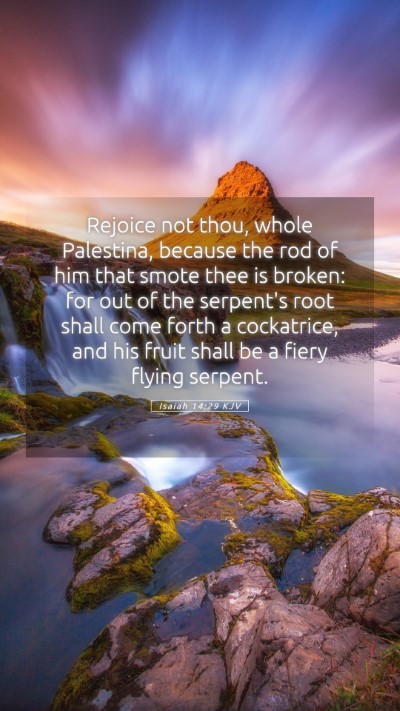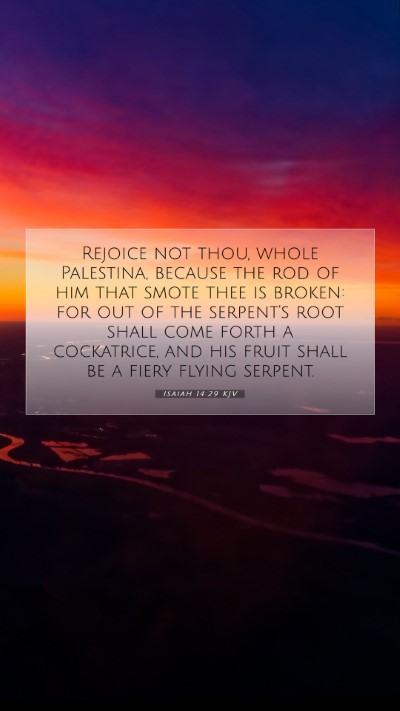Bible Verse Commentary on Isaiah 14:29
Isaiah 14:29 states: "Rejoice not thou, whole Palestina, because the rod of him that smote thee is broken: for out of the serpent's root shall come forth a cockatrice, and his fruit shall be a fiery flying serpent." This verse, rich in imagery and context, has been the subject of various interpretations and analyses by biblical scholars.
Overview of Isaiah 14:29
This verse appears in the context of prophecy concerning the downfall of the Philistines and serves as a warning against premature rejoicing. The imagery of the “cockatrice” and “fiery flying serpent” symbolizes danger and destruction, indicating that new threats may arise even as present ones fall.
Bible Verse Meaning
- Warning Against Rejoicing: The opening admonition to not rejoice highlights the futility of celebrating too soon. Commentary interprets this as a reminder that while enemies may appear defeated, the threat of new dangers, symbolized by the “serpent's root,” remains.
- Symbolism of the Cockatrice: The mention of a “cockatrice” or “serpent” signifies evil and destruction. Scholars like Matthew Henry suggest this indicates that even from what seems to be a source of defeat, a new evil can arise.
- Context of Prophecy: According to Albert Barnes, this passage relates to the larger prophetic narrative in Isaiah, warning of impending judgment and the cyclical nature of conflict faced by God's people.
- Historical Background: Adam Clarke notes the historical context of the Philistines’ consistent opposition to Israel and how this prophecy serves to remind Israel of their reliance on God amidst adversaries.
Insights from Public Domain Commentaries
Various biblical scholars provide additional layers of meaning to this verse:
- Matthew Henry: Henry elaborates on the significance of this verse as a cautionary tale about overconfidence in victory. He emphasizes that the downfall of a foe does not guarantee lasting peace.
- Albert Barnes: Barnes draws attention to the emerging threats that will arise from what seems like victory, cautioning against complacency and reminding readers to remain vigilant.
- Adam Clarke: Clarke points out that this verse is prophetic concerning the future of the neighboring nations and serves as an indication of God's control over historical events.
Understanding Scripture Through Isaiah 14:29
To grasp the full understanding of this scriptural message, one should consider:
- The historical context of the Philistines in relation to Israel.
- The repeated theme of reliance on God amid adversity found throughout Isaiah.
- The broader implications of failing to recognize the dynamic nature of conflict and peace in biblical narratives.
Application of the Verse in Daily Life
The lessons from Isaiah 14:29 can be applied to modern life in numerous ways:
- Staying Vigilant: Just as this verse cautions against overconfidence in apparent victories, individuals today should remain aware of life’s uncertainties.
- Trusting in God: The verse encourages reliance on God’s strength in times of turmoil, reminding believers that external challenges may persist even amid perceived success.
- Understanding the Cycle of Life: This text invites reflection on the inevitability of challenges and the importance of faith and resilience.
Cross References
Isaiah 14:29 can be cross-referenced with other biblical passages that explore similar themes:
- Isaiah 10:12: Discusses the judgment of Assyria and the consequences of pride.
- Jeremiah 46:2: A prophecy against Egypt which carries warnings similar to Isaiah 14.
- Isaiah 30:31: Speaks of the judgment on Assyria and the nature of destruction that awaits God's enemies.
Conclusion
In conclusion, Isaiah 14:29 serves as a compelling reminder of the complexities of spiritual and earthly conflicts. Through the insights gained from various commentaries, we understand the prophetic and cautionary nature of this verse. As individuals engage in Bible study or participate in Bible study groups, the themes of vigilance, reliance on God, and the cyclical nature of conflict become important lessons that resonate through time.
Final Thoughts
By studying such verses, believers can deepen their understanding of Scripture and apply these teachings in their daily lives, encouraging continual growth in faith and resilience amid adversity.


